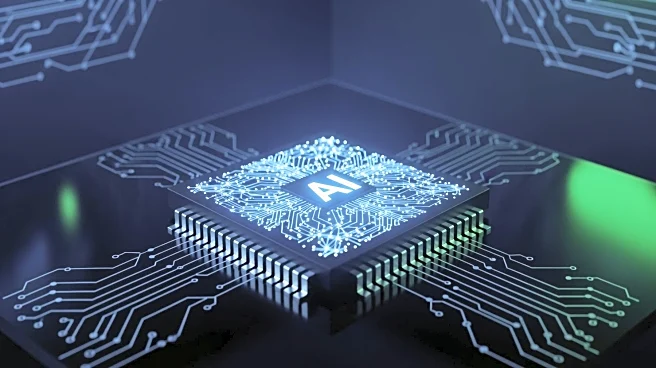What's Happening?
Nvidia CEO Jensen Huang recently spoke at London Tech Week, where he emphasized the transformative nature of artificial intelligence (AI) in programming. Huang likened programming AI to 'programming a person,' suggesting that the new programming language
is 'human.' He explained that AI allows individuals to interact with computers using plain language, making technology more accessible. Huang noted that traditional programming languages like C++ and Python are known by few, whereas everyone understands human language. This shift, according to Huang, democratizes technology, enabling anyone to program computers by simply asking them to perform tasks. Huang's remarks underscore AI's potential to simplify complex technological processes and broaden access to computing.
Why It's Important?
Huang's perspective on AI as a 'great equalizer' has significant implications for the tech industry and society at large. By making programming more accessible, AI could reduce barriers to entry in technology fields, potentially diversifying the industry and fostering innovation. This democratization of technology could lead to increased participation from individuals who previously lacked the technical skills required for programming. Moreover, AI's ability to simplify interactions with computers could accelerate advancements in various sectors, including education, healthcare, and agriculture, by enabling more intuitive and efficient use of technology. As AI continues to evolve, its role in reshaping how people interact with technology could have profound effects on economic and social structures.
What's Next?
The ongoing development of AI technologies suggests further integration into everyday applications, potentially leading to widespread adoption across industries. As AI becomes more user-friendly, businesses and educational institutions may increasingly incorporate AI tools to enhance productivity and learning experiences. Stakeholders in the tech industry might focus on developing AI systems that are even more intuitive and capable of understanding complex human requests. Additionally, policymakers may need to address ethical considerations and regulatory frameworks to ensure responsible AI use. The shift towards human-centric programming could also prompt discussions on the future of traditional coding skills and their relevance in an AI-driven world.
Beyond the Headlines
The concept of AI as a 'great equalizer' raises ethical and cultural questions about the role of technology in society. While AI can democratize access to technology, it also necessitates discussions on data privacy, security, and the potential for bias in AI systems. As AI becomes more integrated into daily life, there may be cultural shifts in how people perceive and interact with technology, potentially altering societal norms and expectations. Furthermore, the reliance on AI for programming tasks could impact employment in tech sectors, prompting considerations about workforce adaptation and the need for new skill sets.

















